What Makes a House Iconic?
Architectural Conservation Trust Launched
SPECIAL - Best of Belgium
The Humanism of Charlotte Perriand
Join City Icons: Barcelona & Beyond, May 29-31, 2026
SPECIAL - Casas Icónicas en España!
Inside UNESCO Icons: Houses That Made History - Part 1
Inside UNESCO Icons: Houses That Made History - Part 2
Czech It Out: A Stylish Soirée of Exhibition and Film
Sopot Hosts Icons of Czech Avantgarde Exhibition
Pioneers of the Dutch Modern House - Film Screenings
Iconic Encounters: Barcelona
SPECIAL – Austria
SPECIAL – Czech Classics
SPECIAL - Vacances en France!
SPECIAL – Iconic Dreams Europe
SPECIAL – Iconic Dreams North America
Tautes Heim. Story & Details
Casa Gomis acquired by Spain's Ministry of Culture
Our Badge of Honour
New Year's Reception and Eileen Gray Screening
Funding Win Marks Anniversary of Mackintosh Acquisition
Modernist Houses Lost in the LA Wildfires
Casa d’Abreu Neto: Siza’s First Work
Pioneers of the Dutch Modern House
Iconic Encounters: London
Interview in Leading Catalan newspaper ARA
Record Number of New Iconic Houses - Part 1
Record Number of New Iconic Houses - Part 2
At Plečnik House: To Decide Where the Shadow Falls
A Story of Burnt Books and Broken Bricks
Remembering Irving J. Gill
Iconic Houses in the Media in 2024
Bauhaus Villa in Berlin For Sale
Historical Exhibition, Marie-Laure de Noailles, Painter, Conversation
Mackintosh’s Hill House Becomes an International Iconic House!
Istanbul’s Modernist Ataköy Housing Estate is At Risk
Early Furniture Designs by Le Corbusier on Permanent Display in Maison Blanche
Photo Report City Icons Amsterdam
Healing Through Architecture
Reopening An Iconic Modernist Landmark
City Icons Kick Off with Talk by Linda Vlassenrood
MORE MIES - Pure Architecture in Haus Lange Haus Esters
Through a Bauhaus Lens: Edith Tudor-Hart and Isokon
Modernism Week Lecture: 12 Years of Iconic Houses
Aluminaire House Grand Opening
Exhibition Icons of the Czech Avant-Garde
An Elementalist and Mediterranean Architecture
Icon for Sale - Loos Villa: Haus Horner
SPECIAL – UK Originals
SPECIAL – Dutch Delights!
SPECIAL – German Greats!
SPECIAL – Northern (High)Lights!
SPECIAL – Iconic Collective Housing
SPECIAL – Women & Iconic Houses
SPECIAL – Iconic Artist Residencies
Support the Frankfurt Declaration (on Housing)
Winy Wants a World Wonder
Welcome Atelier Volten!
Sleep in a Modernist Gem – Huis Billiet in Bruges
Iconic Houses in The Netherlands - 100 Years Van Zessen House
Exclusive Tour and Film Screening Package
The Last House Designed by Adolf Loos Will Be Built in Prague
Icons of the Czech Avantgarde
Icon for Sale - Casa Legorreta
Rietveld Day: 200 Enthusiasts Explored 3 Utrecht Icons
Hurray! 10 Years Iconic Houses
7th International Iconic Houses Conference A Huge Success
Meet Conference Co-Chair Iveta Černá
Meet Conference Co-Chair Maria Szadkowska
Eighteen Iconic Houses Under One Roof
17 June - 'Pioneers-film' Screening Amersfoort
Iconic Houses in The Netherlands - Van Eesteren House Museum
Welcome Margarete Schütte-Lihotzky Zentrum in Vienna!
Welcome Vila Volman! Jewel of Czech Functionalism
Movie Night: Adolf Loos- Revolutionary Among Architects
'Inside Iconic Houses' Case Study House #26 Webcast in Webshop
Inside Iconic Houses at Taut’s Home in Berlin
Rediscovering Forgotten Loos Interiors in Pilsen
'Inside Iconic Houses' - Online Tour Program
Iconic Houses in The Netherlands - The Diagoon House
Iconic Houses in The Netherlands - Rietveld Schröder House
Rietveld Houses Owners Association
Corberó Space: New Life for Hidden Jewel
Iconic Houses in The Netherlands - Pierre Cuypers' House and Workshops
Reeuwijk Celebrates Completion of Restoration Rietveld Homes!
Iconic Houses in The Netherlands - Van Doesburg Rinsema House
Welcome Rietveld's Van Daalen House!
Architect Harry Gessner Passed Away at 97
Watch Pioneers of the Dutch Modern House Now On Demand
Icon Saved: Dorchester Drive House
Welcome Umbrella House!
Iconic Houses in the Netherlands – Berlage’s Masterpiece
Iconic Houses in The Netherlands - Het Schip
Inside Iconic Houses - Tour of Maison Cazenave
Inside Iconic Houses Tours Vizcaya Museum & Gardens in Miami
Casa Masó Celebrates 10 Year Anniversary
Inside Iconic Houses tours Roland Reisley's Usonian Frank Lloyd Wright House
Rietveld’s Experimental Housing in Reeuwijk Saved
Serralves Villa after restoration
Portraits of the Architect - Interview with Gennaro Postiglione
Test Labs for New Ideas - Interview with Natascha Drabbe
Inside Iconic Houses - Isokon Building
Inside Iconic Houses - 16 December: Sunnylands with Janice Lyle
BCN-BXL Coderch-De Koninck - Beyond Time
New Chairman Architect Nanne de Ru on The Perfect Platform
Health and Home - Interview with Beatriz Colomina
A Life Less Ordinary – Interview with Valentijn Carbo
Invisible Women - Interview with Alice T. Friedman
Winy Maas on the Green Dip
Anita Blom on Experimental Housing of the 1970s
Women’s Worlds - Interview with Natalie Dubois
The Culture of Living - Interview with Robert von der Nahmer
Hetty Berens: A Fresh Take on Modernism
Niek Smit on Supporting Modern Heritage
Alice Roegholt on Amsterdam’s Working-Class Palaces
July is Iconic Houses Month
Hans van Heeswijk on The Pioneers of the Dutch Modern House
Wessel de Jonge on Dutch Icons at Risk
Save Maison Zilveli - Sign the Petition!
How a Building Tells a Story - Recorded Event
Toolkit for Owners of a Modern House
13 Aalto Sites Nominated for UNESCO World Heritage
Villa Beer At Risk - Sign the Petition!
Business Cards of Stone, Timber and Concrete in the Brussels Region 1830-1970
Exhibiting & Visiting Modernist Monuments
Fostering Well-Researched Responsible Design
ICONS AT RISK
Enjoy a virtual visit to the California House and a Q&A with architect Peter Gluck
Exhibition 'Modernism and Refuge'
A Hidden Gem of Postmodernism
New Centre for Historic Houses of India
An Online Chronicle of the Douglas House
Villa Henny, geometric style icon in The Netherlands
A Mendini temple in Amsterdam
IH-lectures USA & Canada Feb 2020 on Melnikov House
Sponsors and Friends
An Afternoon with the Glucks
Chandler McCoy on Making Modern Houses Sustainable
Catherine Croft: Getting Away from the Demolition Mentality in the UK
Patrick Weber on Discovering an Unknown Icon
Fiona Fisher on Iconic Interiors
Jocelyn Bouraly on Villa Cavrois
Mireia Massagué on finding success through a new kind of partnership
Danish Moderns – Looking Back at Our Mini-Seminar
Venturo house complements Exhibition Centre WeeGee’s offering
Lecture report: Remembering Richard Neutra
Hôtel Mezzara and the Guimard Museum project
We welcome 13 new members!
BREAKING NEWS: 8 Wright Sites Inscribed on Unesco World Heritage List!
LECTURE 29 August - Raymond Neutra: My Father and Frank Lloyd Wright
Iconic Reads
Iconic Houses End Year Message
City-ordered rebuild of landmark house stirs debate: Appropriate or overreach?
Kohlberg House Restoration in Progress
Planned Demolition of Rietveld Homes in Reeuwijk
Renovation Gili House in Crisis
An Iconic Saga
Restoring Eileen Gray’s Villa E-1027 and Clarifying the Controversies
Modernism on the East Coast
Iconic Houses in Latin America
Conference testimonials
House Tours May 2018
Expert Meetings
Natascha Drabbe - Iconic Houses: The Next Chapter
Terence Riley -KEYNOTE SPEAKER- on Philip Johnson
New era for Villa E-1027 and Cap Moderne
Hilary Lewis on Philip Johnson and his Glass House
John Arbuckle on Great House Tours
William D. Earls on the Harvard Five in New Canaan
Stover Jenkins on Working for Philip Johnson
Frederick Noyes on his Father’s House
Scott Fellows and Craig Bassam on their Passion for Preservation
Jorge Liernur -KEYNOTE SPEAKER- on Latin American Modernism(s)
Fabio Grementieri on Modernism in Argentina
Catalina Corcuera Cabezut on Casa Luis Barragán
Renato Anelli on Lina Bo Bardi’s Casa de Vidro
Tim McClimon on Corporate Preservation
Amanda Nelson on Building Donor Relationships
John Bacon on Planned Giving
Jean-Paul Warmoes on the Art of Fundraising in America
Chandler McCoy on Why Less is More
Katherine Malone-France on Moving with the Times
Anne Mette Rahbæk on Philanthropic Investments and Preservation
Peter McMahon on Saving Modern Houses on Cape Cod
Toshiko Kinoshita on Japanese Modern Heritage Houses
Roland Reisley on Life in a Frank Lloyd Wright House
5th Iconic Houses Conference May 2018
Kristin Stone, Pasadena Tour Company
Restoring the past: The Diego Rivera and Frida Kahlo Home Studio
Behind the Scenes: Hendrick de Keyser Association
Crosby Doe, Architecture for Sale
Latin America Special – Focus on Mexico
De Stijl in Drachten
Preserving the Nancarrow House-Studio
Meet the Friends - Nanne de Ru
Latin America Special – Focus on Brazil
Jan de Jong’s House is Latest Hendrick de Keyser Acquisition
Stay in a Belgian Modernist Masterpiece
In Berlin’s Modernist Network
Rietveld-Schröder House Celebrates De Stijl Anniversary
Meet Our New Foundation Board Members
Maintaining Aalto's Studio – Linoleum Conservation
Virtual Tour of a Papaverhof Home in 3D
Getty Grant for Villa E-1027
Plečnik House in Ljubljana
Iconic Dacha
Iconic Houses: A Bohemian Road Trip
Work in Progress: Capricho de Gaudí
11 Le Corbusier Homes now on Unesco World Heritage List
At home with Le Corbusier
Henry van de Velde’s Study in Haus Hohe Pappeln Restored
Lynda Waggoner reports
A Conference to Remember
4th International Iconic Houses Conference
Guest of Honor - Harry Gesner
Fallingwater: European Lecture Tour
Wright Plus 2016 Walk
Susan Macdonald, Getty Conservation Institute
John Mcllwee, Garcia House
Meet the Friends – Elisabeth Tostrup
Iconic Houses: The Story So Far
Willie van Burgsteden, designer Iconic Houses
Buff Kavelman, Philanthropic Advisor
Meet the Friends - Frederick Noyes
Sheridan Burke, GML Heritage
Meet the Friends - Raymond Neutra
Sidney Williams, Frey House
Franklin Vagnone and Deborah Ryan, Museum Anarchists
Meet the Friends - James Haefner
Toshiko Mori, architect
Malachi Connolly, Cape Cod Modern House Trust
Meet the Friends - Penny Sparke
Lucia Dewey Atwood, Eames House
Cory Buckner, Mutual Housing Site Office
Jeffrey Herr, Hollyhock House
Speaking Volumes: Building the Iconic Houses Library
Sarah Lorenzen, Neutra VDL Studio and Residences
Ted Bosley, Gamble House
Keeping It Modern - Getty Conservation Grants
Meet the Friends - Thomas Schönauer
Wim de Wit, Stanford University
Linda Dishman, Los Angeles Conservancy
Jesse Lattig, Pasadena Heritage
Join us in Los Angeles! Update
Work in Progress: Casa Vicens
Work in Progress: Van Wassenhove House
Work in Progress: Villa Cavrois
Work in Progress: The Pearlroth House
Conference calls!
Follow us!
Third Iconic Houses Conference a huge success
Conference House Tours Barcelona
Marta Lacambra, Fundació Catalunya-La Pedrera
Natascha Drabbe, Iconic Houses Foundation
Special speaker Oscar Tusquets
Jordi Tresserras, UNESCO Network ‘Culture, tourism and development’
Christen Obel, Utzon Foundation
Elena Ruiz Sastre, Casa Broner
Fernando Alvarez Prozorovich, La Ricarda
Tim Benton, Professor of Art History (Emeritus)
Susana Landrove, Docomomo Spain
Rossend Casanova, Casa Bloc
Icon at Risk: Casa Gomis / La Ricarda
Conference Program 25 November 2014
Jordi Falgàs, Casa Rafael Masó
Documentary La Ricarda
Marga Viza, Casa Míla/La Pedrera
Celeste Adams, Frank Lloyd Wright Trust
Conference 25 November 2014 at La Pedrera
Henry Urbach, The Glass House
Victoria & Albert Museum London November 12, 2013
Tommi Lindh, new director of the Alvar Aalto Foundation and Museum
Iveta Černá, Villa Tugendhat
Lynda Waggoner, Fallingwater
Kimberli Meyer, MAK Center
Rent a house designed by Gerrit Rietveld
Barragán House on Screen
Gesamtkunstwerk – An Icon on the Move
Triennale der Moderne 27 September - 13 October 2013
Prestigious Art Nouveau mansions in Brussels open
September 14 + 15: Heritage Days in Paris
June's New Arrivals: Museum Apartments
Iconic Houses is now on Twitter and Facebook
Corbu’s Cabanon: Reconstruction and Lecture
Projekt Mies In Krefeld: Life-sized model of the Krefeld Clubhouse
New arrivals: Spain special
MAMO: Le Corbu’s ‘Park in the Sky’ open 12 June
Taut's Home wins Europa Nostra Award
Annual Wright Architectural Housewalk: 18 May
Frank Lloyd Wright Homes on Screen
Message from the Editor
Neutra’s House on Screen
Michel Richard, Fondation Le Corbusier
Symposium The Public and the Modern House
Melnikov House on Screen
Iconic Houses in the media
Message from the Editor
Round Table Review
Eileen Gray House on Screen
Copy Culture
At Home in the 20th Century
New 20th century Iconic Houses website launches
Philippe Bélaval, Centre des monuments nationaux
De Stijl in Drachten
In 1921 Cees Rienks de Boer (1881-1966), a local architect, was commissioned by Smallingerland (the municipality in which Drachten is located) to design sixteen residential buildings and a school, as part of the expansion plan Stapenséa 1918. The residences of the so-called Parrot District are middle-class housing. De Boer sent his designs to Theo van Doesburg, who, together with architect J.J.P. Oud, critiqued it. Their comments led to certain alterations and additions, such as the cubistic bay windows. These residences and the new school Rijkslandbouwwinterschool were built on the former First Parallel Road, nowadays called the Torenstraat, Houtlaan and Oosterstraat.
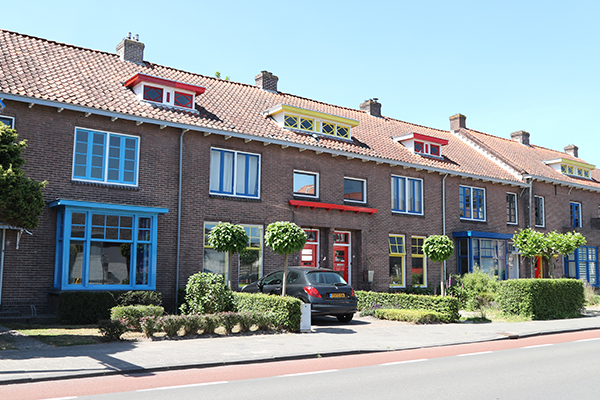
Van Doesburg’s Parrot District
Through the mediation of Evert Rinsema, Van Doesburg was given the opportunity to design a colour scheme for both the exterior and the interior of this project. Van Doesburg designed a scheme based on the primary colours red, blue and yellow, together with the colours black, white and grey for the houses. He also included the gardens of the houses in the colour plan. Given free rein, he incorporated all manner of theories into his plans. Sometimes he took the architecture into account; sometimes he simply did as he pleased.
For the interiors, he used the open-beam ceilings as an interplay of lines in his composition, and for the walls Van Doesburg used grey wallpaper to create colour planes that remained detached from the ceilings and skirting. For the gardens, he designed colour planes using plants, coloured patios and garden paths. The artist chose to use secondary colours such as green, orange and purple for the school building, providing a stark contrast with the primary colours of the residential buildings. The design plans clearly show all of these aspects: architectural theories, classically coloured architectural drawings, free interpretation of architecture and urban design as colour planes and subtle colour compositions with wall coverings and coloured paper.
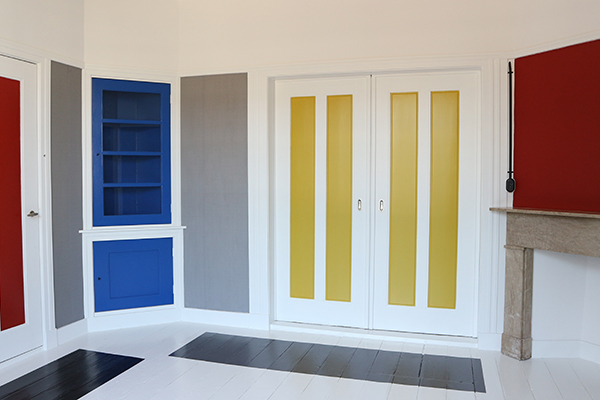
Besides the colour schemes, De Boer asked Van Doesburg to design two stained glass windows for the school: one to be placed in the staircase in the north-façade and one above the entrance in the west-façade. The requirements for the windows were that the depictions had to be related to agriculture and could not be abstract. Therefore, the windows depict a multitude of agricultural labourers, ranging from sowers to mowers, and spaders to harvesters. Van Doesburg applied a method to this design which he called ‘doorbeelden’, which meant that he simplified an image to a collection of geometrical shapes and bright colours. Drawn designs and studies for these windows are a part of the collection of Museum Dr8888.
This unique project to design sixteen residential buildings and a school, turned out to be quite controversial. It was new for an artist to have such freedom to apply art to architecture. However the inhabitants of Drachten were far from happy and soon the neighbourhood got the negative nickname of ‘the Parrot District’ (which has persisted to this day). In less than a year the houses were repainted in more conventional colours and the colour schemes of the school building were never implemented. The school board considered it to be inappropriate to expose the students to such modern ideas. It would take sixty years for the school to be painted in the intended colours in the late 1980s.
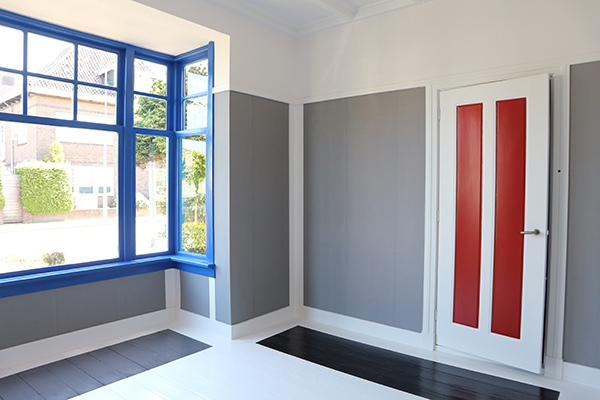
Even nowadays the colour schemes are controversial. In 1988 the original colours were brought back and the “Stichting Theo van Doesburg Drachten” (The Theo van Doesburg Drachten Foundation) was established to maintain the restored designs. The Parrot District is an exceptional residential district in the Netherlands and even more so for the province of Friesland. An artist was involved in the design and execution of the project from the early stages. For both the artist and architect it was a groundbreaking experiment.
The architect De Boer was mostly known for his rather traditional architecture. Some of his projects, ranging from farms, residences and commercial spaces can still be found in Drachten. He was interested in De Stijl, but did not proceed to plaster the walls of the Parrot District white or to make the main building material concrete, which was considered the epitome of modernity back then and which Oud and Van Doesburg thought was necessary to accentuate the colourful windows. This was most likely due to financial constraints, although De Boer already struggled to get the extremely modern colour schemes approved by the local government.
The proposal to finish the corners of the buildings with iron and glass never materialised. Van Doesburg’s colour schemes were inspired by the typical usage of primary colours in De Stijl. Many of the sketches and designs for the interiors and exteriors made by Theo van Doesburg are part of the collection of Museum Dr8888.
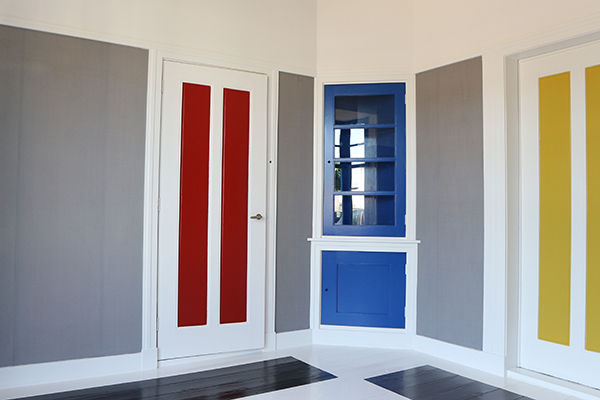
The Van Doesburg-Rinsema House
In 2011, Museum Dr8888 devised plans to restore one of the houses in the Parrot District and turn it into a museum house, the so-called Van Doesburg-Rinsema House. The museum examined the question of whether, following the example of the Rietveld Schröder House in Utrecht, this house could serve as a branch of Museum Dr8888. One of these residences is currently being returned to its original state in both its interior and exterior, following extensive historical and architectural research. Research was also conducted on the colours of the residences, which is generally a difficult process. The project in Drachten proves that it does not have to be.
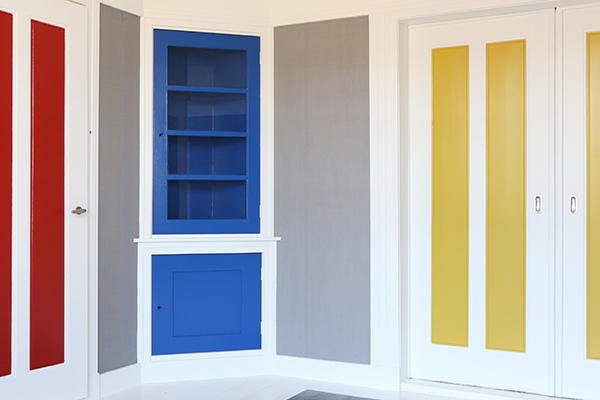
Research and Reconstruction
Research has been done in the history of the district’s buildings and their colours. Van Doesburg’s letters, in which he describes which pigments were to be used and what he thought of the result, were also examined. The first phase of the research, with help of the Rijksmuseum and the University of Amsterdam, into the in-situ paint layers showed quite clearly that the original layers of paint were still present underneath over a dozen later layers. Fragments of wallpaper were also found in the houses that correspond with Van Doesburg’s original samples and design drawings. Initially it was unclear whether Van Doesburg’s plans for the wallpapers were implemented and if so, in which manner. Through archival research, in-situ research and reconstructions it could be concluded that the wallpaper was most likely implemented in the initial construction of the houses, but not entirely as envisioned by Van Doesburg.
The results of the archival research demonstrated that the wallpaper was of great relevance for the whole colour scheme of the house and that Van Doesburg used it as a starting point for the colours. This gives an interesting insight into the design process of the artist. In addition, it could be concluded that the way of ‘framing’ the wallpaper with white borders (by paper or by paint) was of great importance for Van Doesburg, as he also emphasized this in his plans. However his envisioned method of hanging wallpaper in the bedrooms could not be executed as he had drawn the positions of the windows and doors incorrectly on his drawings to De Boer. This resulted in the absence of white borders.
Instructions for the application of wallpaper can be found on a document made by Van Doesburg in which he linked a list of wallpapers samples to the colour harmonies. Various names and addresses were also noted on the document, as were locations such as ‘Upstairs’ and the amounts of wallpaper available to him. The samples on this list were examined on their origin, pattern style, printing process and aging. Original wallpaper fragments were also found in another house of the Parrot District. One of these fragments was then digitally reconstructed to a full pattern and was printed for the reconstruction of the residence.
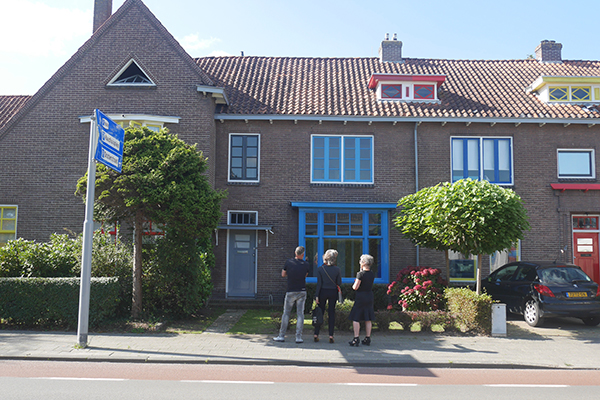
The Future of the House
Starting on the first of June, 2017, Museum Dr8888 and the Van Doesburg-Rinsema House Foundation will start special programming for the museum’s Van Doesburg-Rinsema House. Despite the delay in the realization of the historic residence, the museum and the Van Doesburg-Rinsema House Foundation are making it possible for visitors to visit the house for a preview of the work in progress. Additionally, it is possible to get a first glance of how the rest of the residence will look like thanks to a purpose-built virtual reality app. The app, developed by Grendel Games, provides an interactive 3D-preview of the finished house: a virtual look behind the scenes.
In the future, when the Van Doesburg-Rinsema House is completed, Museum Dr8888 will use this extra exhibition space for the display of facsimiles of the designs of Theo van Doesburg and Cees Rienks de Boer, and replicas of furniture designed by Thijs Rinsema.
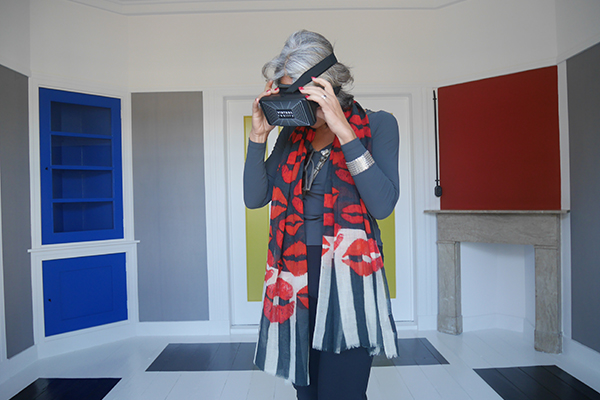
Posted October 25, 2017